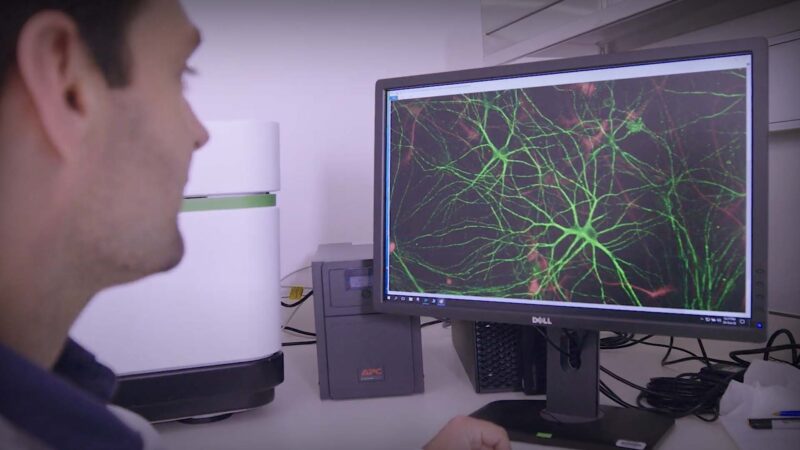STEM CELLS USED FOR AGE-RELATED MACULAR DEGENERATION
Dr Jenna Hall
Senior Research Associate
University of Melbourne, Victoria, Australia
RESEARCHER PROFILE
Filmed in Melbourne, Australia | January 2025
Dr. Jenna Hall is a passionate and accomplished biologist with expertise in induced pluripotent stem cell (iPSC) culture, disease modelling, and high-throughput automated systems. She recently earned her PhD from the University of Melbourne, where her research focused on using iPSC-derived retinal pigment epithelium (RPE) cells to study age-related macular degeneration. Dr Hall’s technical skillset spans manual and automated cell reprogramming and differentiation, quantitative microscopy-based phenotyping, and large scale -omics analysis.
Dr Hall was awarded a highly competitive and sought after Australian Research Council Centre for Personalised Therapeutics and Technologies (ARC CPTT) scholarship which, in addition to funding her PhD, included an industry internship with a leading life sciences consultancy firm. Her internship with Biointelect allowed her to contribute to strategic projects addressing key challenges in Australia’s biotechnology ecosystem. Her white papers on the country’s vaccine and drug value chain, as well as anti-obesity medication, demonstrated her ability to combine scientific knowledge with commercial insights to influence policy and improve pandemic preparedness.
Dr Hall has over four years of industry experience, including her time at the New York Stem Cell Foundation, where she collaborated with engineers and data scientists to develop scalable workflows for cell reprogramming, downstream differentiation, and automated maintenance. For her next career step, Dr Hall is hoping to secure a role in a fertility research lab.
You Might also like
-
At the frontier of human cellular neuroscience research
Associate Professor Cedric Bardy is the Director of The Laboratory for Human Neurophysiology, Genetics & Stem Cells, located at SAHMRI. South Australia.
His current research uses preclinical, patient-derived cell models to test innovative therapeutic strategies, with a current focus on Parkinson’s disease, brain cancer and childhood dementia (Sanfilippo syndrome).
His work has established a platform to facilitate the discovery and validation of treatments for brain disorders. Their research is at the frontier of human cellular neuroscience research and translational applications that benefit global public health.
-
Investigating invasive lobular carcinoma and metaplastic breast cancer sub-types
Assoc Prof McCart Reed is the scientific lead on an MRFF-funded (Medical Research Future Fund) genomics program investigating the potential for the application of Whole Genome Sequencing in the breast cancer care pathway in Australia, ‘Q-IMPROvE’. She applies genomics and spatial transcriptomics methodologies to archival clinical samples to understand the differences between tumour types and their potential for treatment. Amy is passionate about clinical research, biobanking and precision oncology. In addition to her breast cancer research portfolio, she is on the steering committee for the Brisbane Breast Bank and the Scientific Advisory Board for Breast Cancer Trials.
-
Exercise therapy for metabolic dysfunction-associated steatotic liver disease
Dr Shelley Keating is a Senior Lecturer in Clinical Exercise Physiology and Accredited Exercise Physiologist from the School of Human Movement and Nutrition Sciences at the University of Queensland. With a strong grounding in exercise metabolism and body composition, Dr Keating’s research centres on the utility of exercise as a therapy for obesity and related cardiometabolic conditions, notably metabolic dysfunction-associated steatotic liver disease (MASLD).



